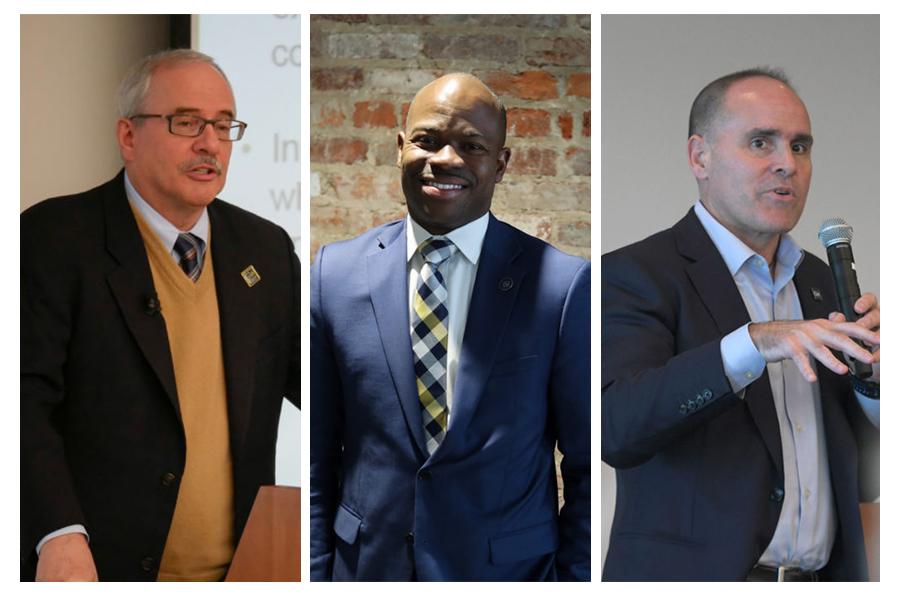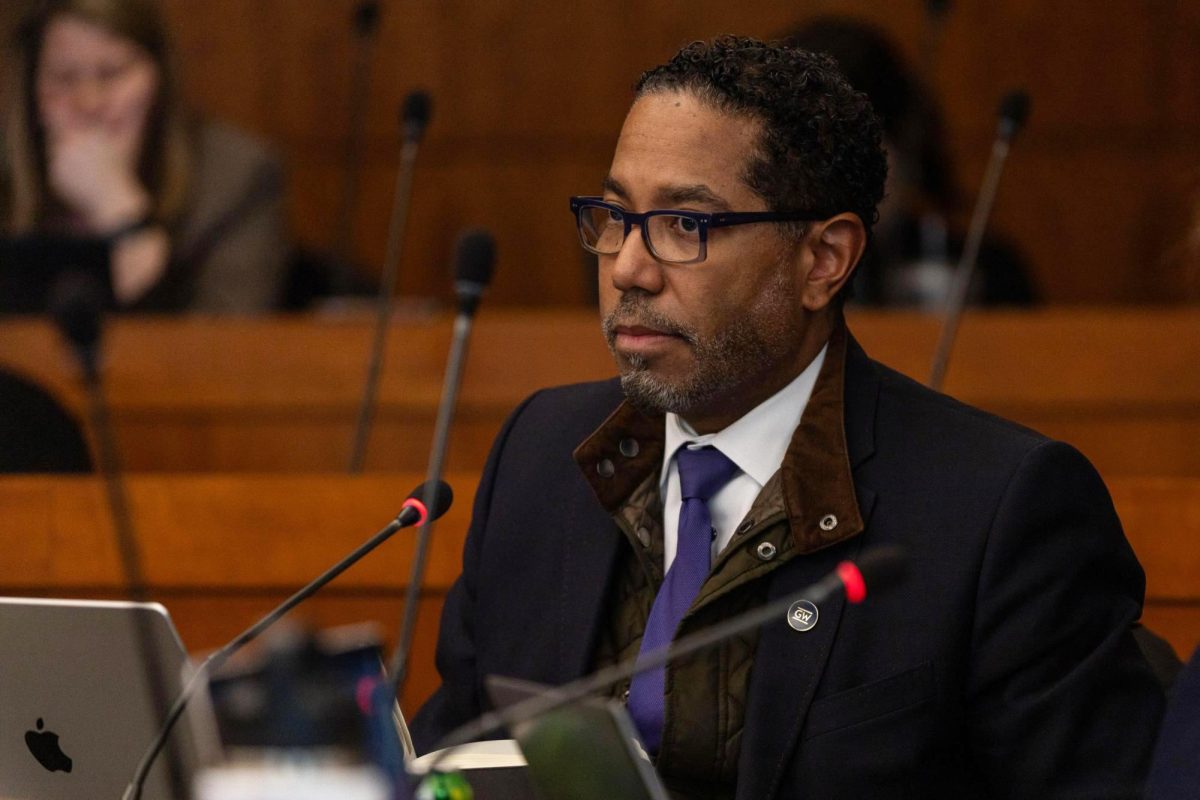Updated: April 26, 2021 at 1:37 p.m.
Faculty said University President Thomas LeBlanc may not be able to salvage relationships with the GW community on the heels of a year marked by ongoing tensions between the two and calls for LeBlanc to resign.
Tensions between LeBlanc and faculty members have been escalating since last February but have heightened this past year as various student groups, faculty and alumni launched petitions and statements criticizing his performance and calling for his resignation. Now, as the Board of Trustees works to conduct its standard review of LeBlanc – which they last conducted in spring 2019 – half a dozen faculty members said relations with the administration may have “passed the point of no return,” as they continue to await the future of LeBlanc’s leadership.
Professors’ frustrations with LeBlanc culminated in a Faculty Assembly meeting last fall when faculty overwhelmingly voted to survey University leadership. The survey results, which officials released this spring, revealed that a majority of the full-time faculty surveyed has lost confidence in the president, and experts in higher education administration said the results could jeopardize LeBlanc’s future at GW.
Leo Chalupa, a professor of pharmacology and physiology and GW’s former vice president of research, said the “breach in trust” between LeBlanc and the faculty will be a “tremendous challenge” to fix.
“It’s certainly not impossible that things could be fixed, but it’s pretty unlikely because the extent of the negativity towards him is so widespread,” he said.
Chalupa, who served as an administrator for nearly 10 years, said LeBlanc may not be able to “point to a number of clear accomplishments” that former University President Steven Knapp could, like improvements to GW’s research rankings and the development of the Science and Engineering Hall.
“So in my judgment, a tremendous amount was accomplished during Steven Knapp’s tenure,” he said. “Now we’re four years into President LeBlanc’s, and I’ll let you decide what are the accomplishments.”
He said for LeBlanc to improve relationships with faculty, he would have to do “something really big,” like investing $100 million into the research enterprise across GW. Professors have recently expressed concern for faculty research funds, saying the proposed budget for the upcoming fiscal year does not allocate enough money for research in a time when the pandemic has driven up the need for investment.
“Small little things are unlikely to shift faculty opinion, in my opinion,” he said. “Something bold, something big, I mean a great gift would be fantastic, opening up some kind of new program, something that would make GW prominent that he could be associated with.”
Elizabeth Anker – an associate professor of American studies and political science and a member of the Faculty Association, a group of full-time faculty – said it’s unlikely LeBlanc will be able to improve relationships with the GW community since he has remained “remarkably inflexible” adjusting to the position of University president for “more than a few years.”
“In all of his time here, I have never once heard him ask a genuine question of any faculty, student or staff member,” Anker said in an email. “He lacks curiosity about who we are and thus lacks understanding of what makes GW special. Unfortunately, I do not expect anything different at this point.”
She said the results of the faculty survey on University leadership “speak for themselves,” indicating a high disapproval rating from faculty across all schools and ranks.
“A vast majority of faculty do not think that LeBlanc understands GW and its core values, do not think he acts in good faith and do not think he comprehends how university governance is supposed to work,” she said. “It is upsetting to think how low GW’s morale, working conditions and governance have fallen since Steven Knapp was president.”
Gregory Squires, a professor of sociology and member of the Faculty Association, said he suspects LeBlanc has “passed the point of no return” when it comes to repairing relationships with GW community members.
“At this point there’s just been so many examples of issues that have been problematic for students and faculty and that at this point his contract is up for renewal within the year, so then I think if that were to be extended, that would be viewed as a real blow to the morale of the faculty,” he said.
LeBlanc has also come under fire in the past year for staff layoffs during the COVID-19 pandemic and the hire of Heather Swain, a Michigan State University official who was involved in the Larry Nassar sexual abuse case.
Squires said it’s “stunning” how negative the faculty survey results are, indicating a “sweeping condemnation” of LeBlanc’s leadership abilities.
“And to ignore that, I think, would be a real misstep on the part of the Board,” Squires said. “I don’t see how he can be an effective leader.”
Kathryn Kleppinger, an associate professor of French studies and international affairs, said she was initially optimistic about LeBlanc because he identified issues at the University similar to what she noticed, like the school’s “transactional culture” that limits progress. She said she has since lost all confidence in his ability to restore trust with faculty members because many feel like they have been “exploited” under his tenure with his proposed improvements like his strategic plan.
More than 80 professors launched the first formal call for LeBlanc to resign last February, with a petition citing LeBlanc’s support of officials’ plan to decrease undergraduate enrollment by nearly 20 percent and increase the proportion of STEM students by 30 percent, which they say could damage the racial, ethnic and economic diversity of GW’s student body. Faculty also cited the University’s partnership with the Disney Institute and a racially insensitive comment LeBlanc made in a video as reasons for his resignation.
Kleppinger said LeBlanc has not made a concerted effort to communicate or consult with faculty perspectives on University matters, like the unknown costs of the Disney Institute, relying instead on outside consultants with a “corporate doublespeak” to guide the school’s trajectory.
“He’s repeatedly demonstrated on so many occasions that he doesn’t really listen to us,” she said. “I’m not in a position to believe him, if he actually says he’s going to listen to us subsequently.”
But Dwayne Wright, a visiting assistant professor of higher education administration, said LeBlanc’s statements in recent weeks regarding the Derek Chauvin trial and offering support to GW community members, have been “some of the best” he has seen from University leaders since he started at GW in fall 2019. He said he doesn’t believe people are “irredeemable” and said it is up to the Board to decide whether or not they have confidence in his abilities following the faculty survey results.
“I hope that they take all information into consideration, and if President LeBlanc is reselected that there is a message to him from the Board to work in a much more conciliatory nature with the faculty,” he said.
Wright said he recently met with Provost Brian Blake and the GW Collaborative for Inclusive Excellence, a group of deans and “diversity directors,” and felt that officials were attentive to their concerns in their meeting.
“So I think the next step now that it seems like they’re willing to listen, is that they’re going to incorporate our feedback,” he said. “Because those are the two things that I haven’t experienced in my time here. One, they’re very slow to listen, and when they do, what you say doesn’t get incorporated.”











